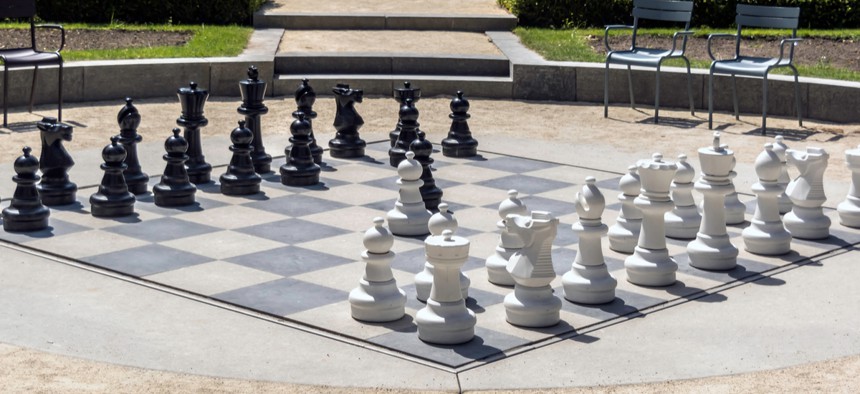An Easy Way to Make More Ambitious Decisions

Shutterstock

Connecting state and local government leaders
Pretend it isn't about you.
I’ve always had an impossibly hard time making decisions for myself. Whether it’s which fruit to buy at the grocery store or whether to take a new job, I flip-flop constantly, frustrating myself and the people around me. The worst part about this uncertainty is that when it comes to other people’s issues, I’m clear as day. I can easily analyze their situation, assess risks and rewards, and suggest solutions without second-guessing myself or my friends.
“Too bad you can’t take your own advice,” they often reply.
Research suggests I’m not alone in this struggle. A new study published in the journal Organizational Behavior and Human Decision Processes finds that though people often crave risk, our impulse to self-protect paralyzes us from choosing the road less traveled. But we tend to get a lot more adventurous when advising others. And that’s because we actually employ different mindsets when we make decisions for ourselves versus when we recommend decisions for others.
This conclusion, from researchers at the Wisconsin School of Business, East China Normal University, and Xinjiang Normal University, is based on randomized tests involving more than 1,000 participants across eight experiments, to see how people made decisions for themselves and for others when given details about restaurants, jobs, or dating profiles they might choose from.
As study co-author Evan Polman of Wisconsin Business School writes in Harvard Business Review, decisions made for others were guided by the subjects’ overall impressions, rather than the minute details of each option:
“They were bolder, operating from what we called an adventurous mindset. An adventurous mindset prioritizes novelty over a deeper dive into what those options actually consist of; the availability of numerous choices is more appealing than their viability. Simply put, they preferred and examined more information before making a choice, and as my previous research has shown, they recommended their choice to others with more gusto.”
In contrast, when participants were making decisions for themselves, they got hyper-granular and operated from a more cautious mindset, essentially overanalyzing the decision. “Rather than exploring and collecting a plethora of options, the cautious mindset prefers to consider a few at a time on a deeper level, examining a cross-section of the larger whole,” Polman noted in HBR. As a result, we tend to overcompensate for the risks we see, which means we probably end up being more risk-averse than we should.
The research has all kinds of applications to real life, like when we tell a co-worker to jump ship and take that new job offer even though we’d be afraid to make the same move ourselves. Or when a friend has a crush, we urge them to ask the person out, though we’d rather die than text “you free on Friday” to the object of our own desire.
Of course, personality plays a big role here: Some people are inherently more risk-prone than others. And some people genuinely prefer playing it safe in all situations, regardless of the benefits they may be passing up.
But by and large, as this study suggests, we’re more paralyzed by fear of failure, and fear of rejection, than we would like to be. So, how can we train ourselves to make more ambitious life decisions? The research points to a simple strategy: Pretend our issues aren’t our own. Or as Polman put it in his HBR piece, “Instead of asking yourself, ‘what should I do?’ ask yourself ‘what should you do?'”
There are other ways to approximate the adventurous mindset you’d probably have if you were solving the problem on someone else’s behalf. You might think of someone you admire (Steve Jobs is the example that Polman offers) and consider how that person would tackle your problem. Or you might distance yourself from your issues and literally ask someone else—a mentor, colleague, a family member, or friend—what they would do if they were in your situation; the research suggests their advice would be the product of the same adventurous mindset you’re trying to cultivate for yourself.
Leah Fessler is a reporter at Quartz, which originally published this article.

NEXT STORY: A Bipartisan Legislative Initiative to Address a Bleak State Budget Situation




